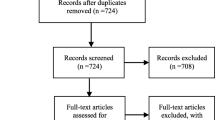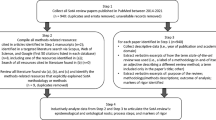Abstract
Objective
Evidence-based medicine has an important place in the teaching and practice of psychiatry. Attempts to teach evidence-based medicine skills can be weakened by conceptual confusions feeding a false polarization between traditional clinical skills and evidence-based medicine.
Methods
The author develops a broader conception of clinical expertise consisting of three tasks, clarifies the role of evidence-based medicine and explores the implications for teaching and practice.
Results
Evidence-based medicine is an essential tool that enables clinicians to assess causal explanations in etiology, risk, or prognosis or to compare treatments.
Conclusion
An explicit and inclusive conceptualization of clinical skills can provide a framework to implement and assess curricular efforts to teach evidence-based medicine.
Similar content being viewed by others
References
Feinstein AR: Clinical Judgment. Williams & Wilkins, 1967
Evidence-Based Medicine Working Group: Evidence-based medicine. A new approach to teaching the practice of medicine. JAMA 1992; 268: 2420–2425
Goldner EM, Bilsker D: Evidence-based psychiatry. Can J Psychiatry 1995; 40: 97–101
Yager J, Greden J, Abrams M, et al: The institute of medicine’s report on research training in psychiatry residency: strategies for reform-background, results, and follow up. Acad Psychiatry 2004; 28: 267–274
Roberts LW, Coverdale JH, Louie AK: Evidence, methods, and psychiatric education. Acad Psychiatry 2003; 27: 227–228
Fenton W, James R, Insel T: Psychiatry residency training, the physician-scientist, and the future of psychiatry. Acad Psychiatry 2004; 28: 263–266
Straus SE, McAlister FA: Evidence-based medicine: a commentary on common criticisms. CMAJ 2000; 163: 837–841
Levine R, Fink M: The case against evidence-based principles in psychiatry. Med Hypotheses 2006; 67: 401–410
Salzman C: The limited role of expert guidelines in teaching psychopharmacology. Acad Psychiatry 2005; 29: 176–179
Gray GE: Concise Guide to Evidence-Based Psychiatry. Arlington, Va, American Psychiatric Publishing, 2004
Richardson WS: Teaching evidence-based practice on foot. ACP J Club 2005; 143: A10–12
March JS, Chrisman A, Breland-Noble A, et al: Using and teaching evidence-based medicine: The Duke University child and adolescent psychiatry model. Child Adolesc Psychiatr Clin N Am 2005; 14: 273–296, viii-ix
Osser DN, Patterson RD, Levitt JJ: Guidelines, algorithms, and evidence-based psychopharmacology training for psychiatric residents. Acad Psychiatry 2005; 29: 180–186
Geddes JR: Evidence-Based Mental Health. London, BMJ, 1998
Srihari V, Martin A: Gained in translation: evidence-based medicine meets pediatric psychopharmacology. Child Adolesc Psychiatr Clin N Am 2006; 15: 263–287
Srihari VH: Pulmonary embolism in a patient taking clozapine. BMJ 2008; 336: 1499–1501
Bilsker D, Goldner EM: Teaching evidence-based practice in mental health. Evid Based Ment Health 1999; 2: 68–69
Sackett DL: Evidence-Based Medicine: How to Practice and Teach EBM. Edinburgh; New York, Churchill Livingstone, 2000
Greenhalgh T: Papers that summarise other papers (systematic reviews and meta-analyses). BMJ 1997; 315: 672–675
Green ML: Evidence-based medicine training in graduate medical education: past, present and future. J Eval Clin Pract 2000; 6: 121–138
Eraut M: Expert and expertise: meanings and perspectives. Learning Health Soc Care 2005; 4: 173–179
Hakkarainen K, Palonen P, Paavola S, et al: Communities of Networked Expertise: Professional and Educational Perspectives. Amsterdam, Elsevier, 2004
Fish FJ, Hamilton M: Fish’s Clinical Psychopathology: Signs and Symptoms in Psychiatry. Bristol, Wright, 1985
Sims A: Symptoms in the Mind: An Introduction to Descriptive Psychopathology. Edinburgh; London, Saunders, 2003
Havens LL: Approaches to the Mind: Movement of the Psychiatric Schools from Sects Toward Science. Boston, Little, Brown, 1973
McHugh PR, Slavney PR: The Perspectives of Psychiatry. Baltimore, Johns Hopkins University Press, 1998
Ghaemi N: The Concepts of Psychiatry: A Pluralistic Approach to the Mind and Mental Illness. Baltimore, Johns Hopkins University Press, 2003, pp 299–308
Jaspers K: General Psychopathology. Manchester, England; Chicago, University of Chicago Press, 1963
Evidence-Based Medicine Working Group, American Medical Association, Guyatt G, Rennie D: Users’ Guides to the Medical Literature: Essentials of Evidence-Based Clinical Practice. Chicago, American Medical Association Press, 2002
Addington J: Cannabis use increases the risk of young people developing psychotic symptoms, particularly if already predisposed. Evid Based Ment Health 2005; 8: 87
Geddes J: Asking structured and focused clinical questions: essential first step of evidence-based practice. Evid Based Ment Health 1999; 2: 35–36
Hatcher S, Oakley-Browne M: Evidence-Based Mental Health Care. Edinburgh; New York, Elsevier Churchill Livingstone, 2005
Steiner JF: Talking about treatment: the language of populations and the language of individuals. Ann Intern Med 1999; 130: 618–622
Greenhalgh T: Narrative-based medicine: narrative-based medicine in an evidence-based world. BMJ 1999; 318: 323–325
Author information
Authors and Affiliations
Corresponding author
Additional information
I am grateful for comments from Andres Martin, Schuyler Henderson, and Stuart Carney. I am also thankful to Dan Bilsker who provided the template for Figure 1.
Rights and permissions
About this article
Cite this article
Srihari, V. Evidence-Based Medicine in the Education of Psychiatrists. Acad Psychiatry 32, 463–469 (2008). https://doi.org/10.1176/appi.ap.32.6.463
Received:
Revised:
Accepted:
Published:
Issue Date:
DOI: https://doi.org/10.1176/appi.ap.32.6.463




